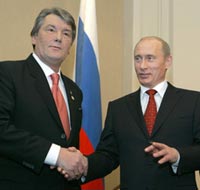
YUSHCHENKO SWEARS BY RUSSIAN GAS DEAL WHILE YEKHANUROV SPILLS THE BEANS
Publication: Eurasia Daily Monitor Volume: 3 Issue: 9
By:

Ukrainian President Viktor Yushchenko is risking his political credibility by blindly defending the Russian-Ukrainian gas deal despite severe criticism of it by Western and Ukrainian experts and a majority of the Ukrainian parliament. Rather than addressing the agreement on its merits, Yushchenko ignores Western critics (some of the most prominent of whom are Orange sympathizers) and imputes political partisan motives to internal critics (whose affiliations range from the leftist opposition to the core pro-democracy community). Yushchenko’s stance seems to reflect his quest for accommodation with a suddenly responsive Kremlin in the run-up to the March parliamentary elections in Ukraine. Meanwhile, even Prime Minister Yuriy Yekhanurov and other Ukrainian officials admit to the January 4 agreement’s flaws and seem even to be distancing themselves from parts of the deal.
During his joint news conference with Russian President Vladimir Putin on January 11 in Astana, Yushchenko described the gas deal as a “wonderful result [that] was reached on the basis of market principles.” He professed to be “convinced that the agreement was drafted professionally [as] a sound compromise, politically, and economically,” and that he was “aware of every provision.”
Along with the government, Yushchenko had assured the nation that the discounted price of $95 per 1,000 cubic meters supplied to Ukraine would apply for the five years of the agreement’s duration, whereas it actually applies for the first six months of that period. Yushchenko did not react when Putin told their joint conference that the price on the Russian component of those supplies would (after the first six months) vary in accordance with “market prices.” Moreover, Turkmenistan has already signaled its intention to demand a higher price next year for the Turkmen component of gas supplies to Ukraine.
In Kyiv on the sidelines of the cabinet of ministers’ January 12 emergency meeting, Yushchenko again told the press, “I am ready to answer for every point of the agreement that was signed” (UNIAN, January 12). However, he is not addressing the agreement’s merits, nor taking notice of the critics who do.
In contrast to the president, Yekhanurov now acknowledges that Kyiv has been blackmailed into signing, and that the agreement is not binding after all. While defending the government’s decision to sign it on January 4 regardless of the flaws, Yekhanurov has begun unveiling some of the agreement’s murky aspects. In a televised interview he recounted some moments of the negotiations in Moscow: “The whole of the pipeline from the Turkmen-Uzbek to the Russian-Ukrainian border is filled by Gazprom’s contractor RosUkrEnergo. We were offered a choice: either this, or [sarcastically] ship gas by train. Thus, we had no choice.”
Until now, Yekhanurov and the government professed to be totally agnostic about RosUkrEnergo’s identity, refusing even to ask questions as long as that company “guaranteed” the $95 price for five years. The government’s dissembling on both counts was the main trigger of the parliament’s January 11 vote of no confidence. Now, the government admits that the $95 price is only valid for six months and is beginning to raise questions about RosUkrEnergo. According to Yekhanurov “We will officially put the questions [who are RosUkrEnergo’s owners] to the Russian side; but I know that if we want to have gas, we have one company to choose from. Or we can opt to not receive gas.”
According to Yekhanurov now, “Ukrainian interests are not represented” in RosUkrEnergo, there is has “no one there from the Ukrainian side.” The “Ukr” part in the company’s name, he said, dates to 2004 when the Kuchma administration and Moscow envisaged forming a Russian-Ukrainian company, but the company remained a Russian one after the change of power in Ukraine.
After signing the January 4 agreement, the Ukrainian government referred to RosUkrEnergo as a joint company in an apparent attempt to suggest that Ukraine’s interests would be represented there. This turns out not to be the case. Thus, the proposed joint venture of Naftohaz Ukrainy and RosUkrEnergo to market gas in Ukraine would not be predominantly Ukrainian as hitherto assumed.
Moreover, Yekhanurov now describes the January 4 agreement as merely a “protocol,” a “road map,” one that “has no consequences, fines or whatever” — i.e., not binding. Asked whether “this means that the sides [shall] follow the agreements signed previously” [i.e., in 2002 and thereafter for the period through 2009], Yekhanurov answered: “Certainly. And there are about 20 documents inter-state and inter-governmental documents and some contracts.”
This assertion refers to the period during which Kyiv, Moscow, and RosUkrEnergo will be negotiating the actual contracts on the volumes and prices of gas supplies and transit services. In sum, it appears that the issue remains in a legal vacuum and subject to political decisions by a strong-armed Kremlin and a vulnerable Yushchenko administration.
(Interfax-Ukraine, UNIAN, Channel Five TV [Kyiv], January 11, 12; see EDM, January 12)




